Developing Manager Project
VerifiedAdded on 2020/12/29
|15
|4751
|475
Project
AI Summary
This project examines the role of a developing manager in the travel industry, using TUI as a case study. It analyzes different management styles, leadership characteristics, communication processes, and organizational culture. The project also includes a self-assessment of management skills, a SWOT analysis, and a career development plan. This content is provided by Desklib, a website offering past papers and solved assignments for students.
Contribute Materials
Your contribution can guide someone’s learning journey. Share your
documents today.
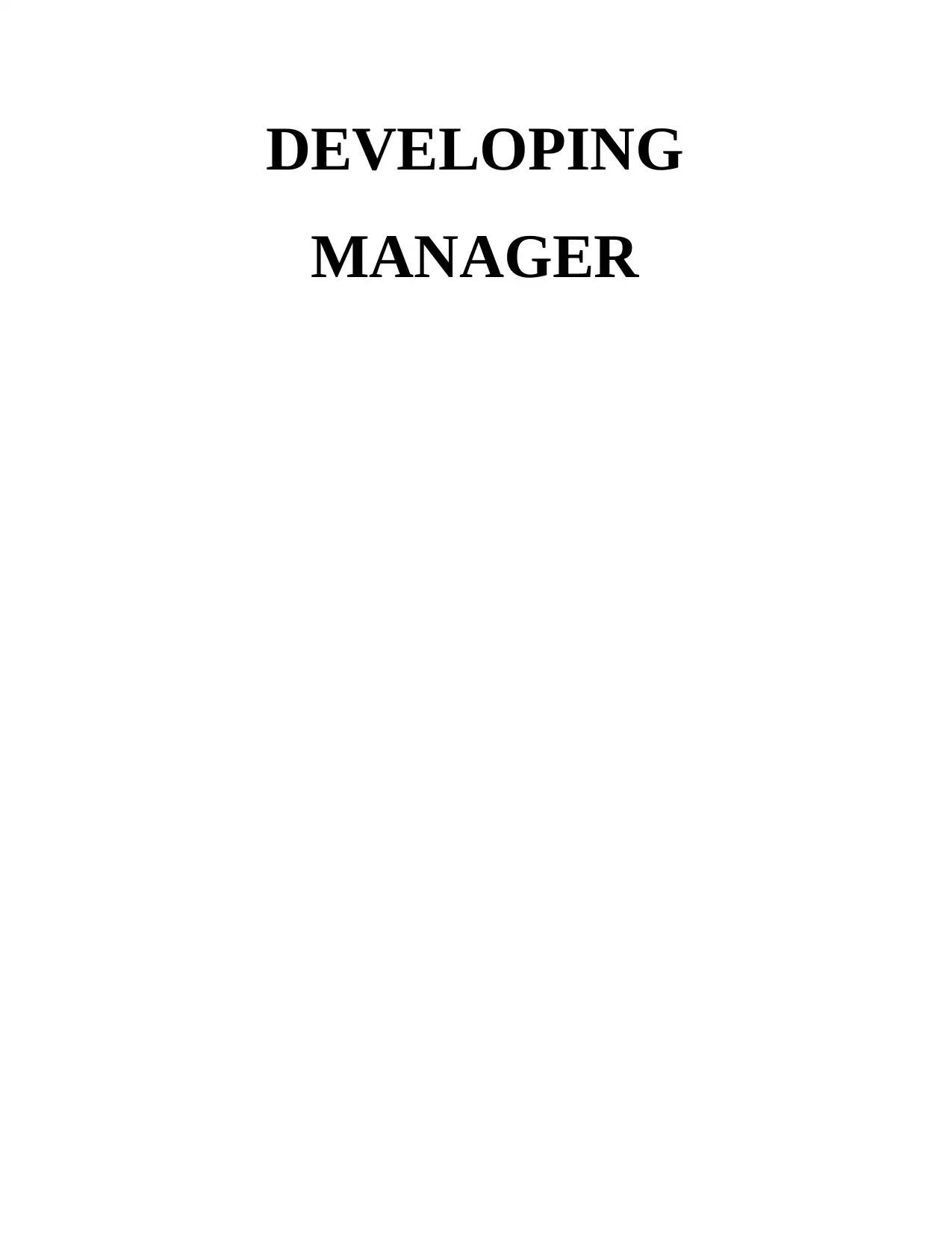
DEVELOPING
MANAGER
MANAGER
Secure Best Marks with AI Grader
Need help grading? Try our AI Grader for instant feedback on your assignments.
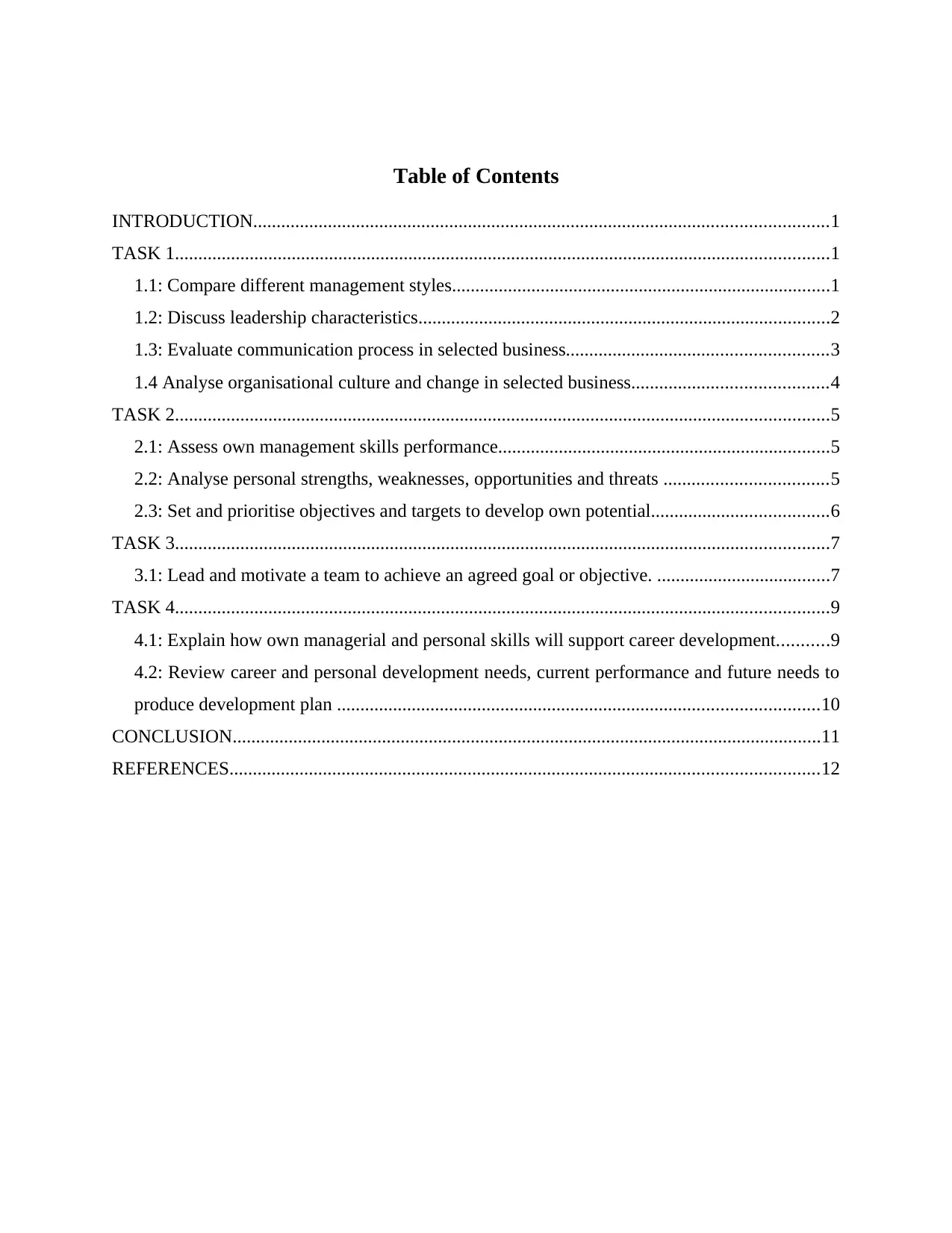
Table of Contents
INTRODUCTION...........................................................................................................................1
TASK 1............................................................................................................................................1
1.1: Compare different management styles.................................................................................1
1.2: Discuss leadership characteristics........................................................................................2
1.3: Evaluate communication process in selected business........................................................3
1.4 Analyse organisational culture and change in selected business..........................................4
TASK 2............................................................................................................................................5
2.1: Assess own management skills performance.......................................................................5
2.2: Analyse personal strengths, weaknesses, opportunities and threats ...................................5
2.3: Set and prioritise objectives and targets to develop own potential......................................6
TASK 3............................................................................................................................................7
3.1: Lead and motivate a team to achieve an agreed goal or objective. .....................................7
TASK 4............................................................................................................................................9
4.1: Explain how own managerial and personal skills will support career development...........9
4.2: Review career and personal development needs, current performance and future needs to
produce development plan .......................................................................................................10
CONCLUSION..............................................................................................................................11
REFERENCES..............................................................................................................................12
INTRODUCTION...........................................................................................................................1
TASK 1............................................................................................................................................1
1.1: Compare different management styles.................................................................................1
1.2: Discuss leadership characteristics........................................................................................2
1.3: Evaluate communication process in selected business........................................................3
1.4 Analyse organisational culture and change in selected business..........................................4
TASK 2............................................................................................................................................5
2.1: Assess own management skills performance.......................................................................5
2.2: Analyse personal strengths, weaknesses, opportunities and threats ...................................5
2.3: Set and prioritise objectives and targets to develop own potential......................................6
TASK 3............................................................................................................................................7
3.1: Lead and motivate a team to achieve an agreed goal or objective. .....................................7
TASK 4............................................................................................................................................9
4.1: Explain how own managerial and personal skills will support career development...........9
4.2: Review career and personal development needs, current performance and future needs to
produce development plan .......................................................................................................10
CONCLUSION..............................................................................................................................11
REFERENCES..............................................................................................................................12
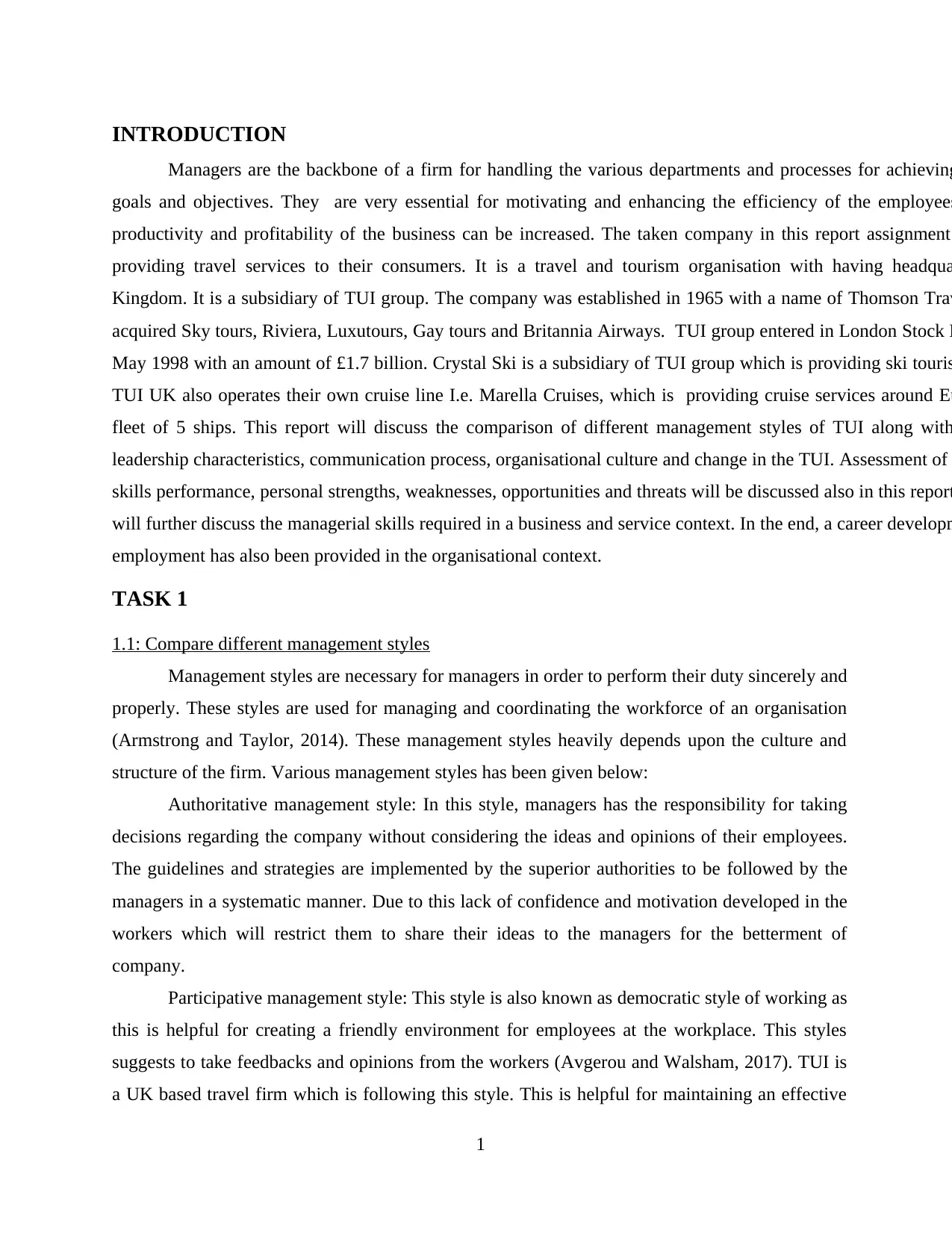
INTRODUCTION
Managers are the backbone of a firm for handling the various departments and processes for achieving
goals and objectives. They are very essential for motivating and enhancing the efficiency of the employees
productivity and profitability of the business can be increased. The taken company in this report assignment
providing travel services to their consumers. It is a travel and tourism organisation with having headqua
Kingdom. It is a subsidiary of TUI group. The company was established in 1965 with a name of Thomson Trav
acquired Sky tours, Riviera, Luxutours, Gay tours and Britannia Airways. TUI group entered in London Stock E
May 1998 with an amount of £1.7 billion. Crystal Ski is a subsidiary of TUI group which is providing ski touris
TUI UK also operates their own cruise line I.e. Marella Cruises, which is providing cruise services around Eu
fleet of 5 ships. This report will discuss the comparison of different management styles of TUI along with
leadership characteristics, communication process, organisational culture and change in the TUI. Assessment of
skills performance, personal strengths, weaknesses, opportunities and threats will be discussed also in this report
will further discuss the managerial skills required in a business and service context. In the end, a career developm
employment has also been provided in the organisational context.
TASK 1
1.1: Compare different management styles
Management styles are necessary for managers in order to perform their duty sincerely and
properly. These styles are used for managing and coordinating the workforce of an organisation
(Armstrong and Taylor, 2014). These management styles heavily depends upon the culture and
structure of the firm. Various management styles has been given below:
Authoritative management style: In this style, managers has the responsibility for taking
decisions regarding the company without considering the ideas and opinions of their employees.
The guidelines and strategies are implemented by the superior authorities to be followed by the
managers in a systematic manner. Due to this lack of confidence and motivation developed in the
workers which will restrict them to share their ideas to the managers for the betterment of
company.
Participative management style: This style is also known as democratic style of working as
this is helpful for creating a friendly environment for employees at the workplace. This styles
suggests to take feedbacks and opinions from the workers (Avgerou and Walsham, 2017). TUI is
a UK based travel firm which is following this style. This is helpful for maintaining an effective
1
Managers are the backbone of a firm for handling the various departments and processes for achieving
goals and objectives. They are very essential for motivating and enhancing the efficiency of the employees
productivity and profitability of the business can be increased. The taken company in this report assignment
providing travel services to their consumers. It is a travel and tourism organisation with having headqua
Kingdom. It is a subsidiary of TUI group. The company was established in 1965 with a name of Thomson Trav
acquired Sky tours, Riviera, Luxutours, Gay tours and Britannia Airways. TUI group entered in London Stock E
May 1998 with an amount of £1.7 billion. Crystal Ski is a subsidiary of TUI group which is providing ski touris
TUI UK also operates their own cruise line I.e. Marella Cruises, which is providing cruise services around Eu
fleet of 5 ships. This report will discuss the comparison of different management styles of TUI along with
leadership characteristics, communication process, organisational culture and change in the TUI. Assessment of
skills performance, personal strengths, weaknesses, opportunities and threats will be discussed also in this report
will further discuss the managerial skills required in a business and service context. In the end, a career developm
employment has also been provided in the organisational context.
TASK 1
1.1: Compare different management styles
Management styles are necessary for managers in order to perform their duty sincerely and
properly. These styles are used for managing and coordinating the workforce of an organisation
(Armstrong and Taylor, 2014). These management styles heavily depends upon the culture and
structure of the firm. Various management styles has been given below:
Authoritative management style: In this style, managers has the responsibility for taking
decisions regarding the company without considering the ideas and opinions of their employees.
The guidelines and strategies are implemented by the superior authorities to be followed by the
managers in a systematic manner. Due to this lack of confidence and motivation developed in the
workers which will restrict them to share their ideas to the managers for the betterment of
company.
Participative management style: This style is also known as democratic style of working as
this is helpful for creating a friendly environment for employees at the workplace. This styles
suggests to take feedbacks and opinions from the workers (Avgerou and Walsham, 2017). TUI is
a UK based travel firm which is following this style. This is helpful for maintaining an effective
1
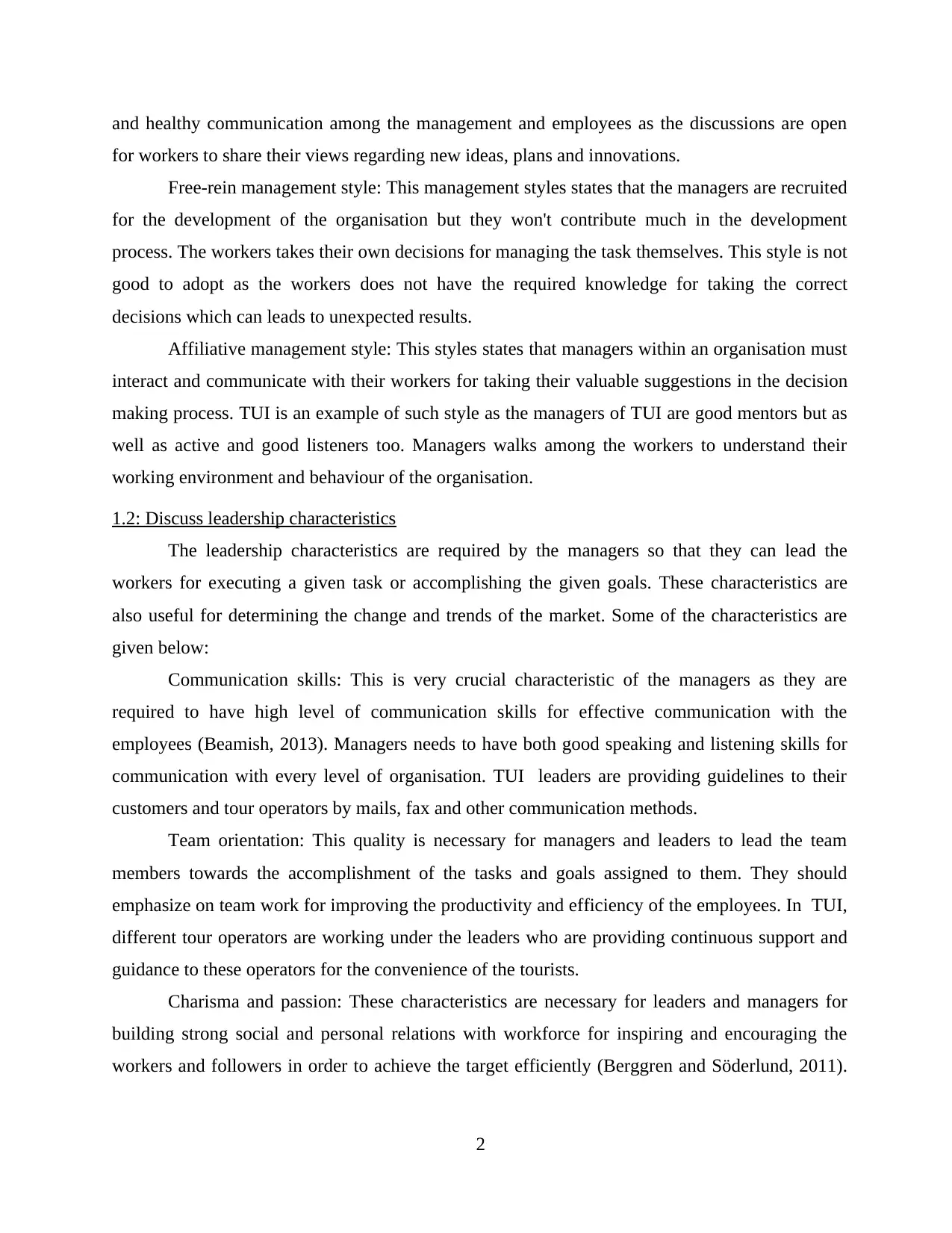
and healthy communication among the management and employees as the discussions are open
for workers to share their views regarding new ideas, plans and innovations.
Free-rein management style: This management styles states that the managers are recruited
for the development of the organisation but they won't contribute much in the development
process. The workers takes their own decisions for managing the task themselves. This style is not
good to adopt as the workers does not have the required knowledge for taking the correct
decisions which can leads to unexpected results.
Affiliative management style: This styles states that managers within an organisation must
interact and communicate with their workers for taking their valuable suggestions in the decision
making process. TUI is an example of such style as the managers of TUI are good mentors but as
well as active and good listeners too. Managers walks among the workers to understand their
working environment and behaviour of the organisation.
1.2: Discuss leadership characteristics
The leadership characteristics are required by the managers so that they can lead the
workers for executing a given task or accomplishing the given goals. These characteristics are
also useful for determining the change and trends of the market. Some of the characteristics are
given below:
Communication skills: This is very crucial characteristic of the managers as they are
required to have high level of communication skills for effective communication with the
employees (Beamish, 2013). Managers needs to have both good speaking and listening skills for
communication with every level of organisation. TUI leaders are providing guidelines to their
customers and tour operators by mails, fax and other communication methods.
Team orientation: This quality is necessary for managers and leaders to lead the team
members towards the accomplishment of the tasks and goals assigned to them. They should
emphasize on team work for improving the productivity and efficiency of the employees. In TUI,
different tour operators are working under the leaders who are providing continuous support and
guidance to these operators for the convenience of the tourists.
Charisma and passion: These characteristics are necessary for leaders and managers for
building strong social and personal relations with workforce for inspiring and encouraging the
workers and followers in order to achieve the target efficiently (Berggren and Söderlund, 2011).
2
for workers to share their views regarding new ideas, plans and innovations.
Free-rein management style: This management styles states that the managers are recruited
for the development of the organisation but they won't contribute much in the development
process. The workers takes their own decisions for managing the task themselves. This style is not
good to adopt as the workers does not have the required knowledge for taking the correct
decisions which can leads to unexpected results.
Affiliative management style: This styles states that managers within an organisation must
interact and communicate with their workers for taking their valuable suggestions in the decision
making process. TUI is an example of such style as the managers of TUI are good mentors but as
well as active and good listeners too. Managers walks among the workers to understand their
working environment and behaviour of the organisation.
1.2: Discuss leadership characteristics
The leadership characteristics are required by the managers so that they can lead the
workers for executing a given task or accomplishing the given goals. These characteristics are
also useful for determining the change and trends of the market. Some of the characteristics are
given below:
Communication skills: This is very crucial characteristic of the managers as they are
required to have high level of communication skills for effective communication with the
employees (Beamish, 2013). Managers needs to have both good speaking and listening skills for
communication with every level of organisation. TUI leaders are providing guidelines to their
customers and tour operators by mails, fax and other communication methods.
Team orientation: This quality is necessary for managers and leaders to lead the team
members towards the accomplishment of the tasks and goals assigned to them. They should
emphasize on team work for improving the productivity and efficiency of the employees. In TUI,
different tour operators are working under the leaders who are providing continuous support and
guidance to these operators for the convenience of the tourists.
Charisma and passion: These characteristics are necessary for leaders and managers for
building strong social and personal relations with workforce for inspiring and encouraging the
workers and followers in order to achieve the target efficiently (Berggren and Söderlund, 2011).
2
Secure Best Marks with AI Grader
Need help grading? Try our AI Grader for instant feedback on your assignments.
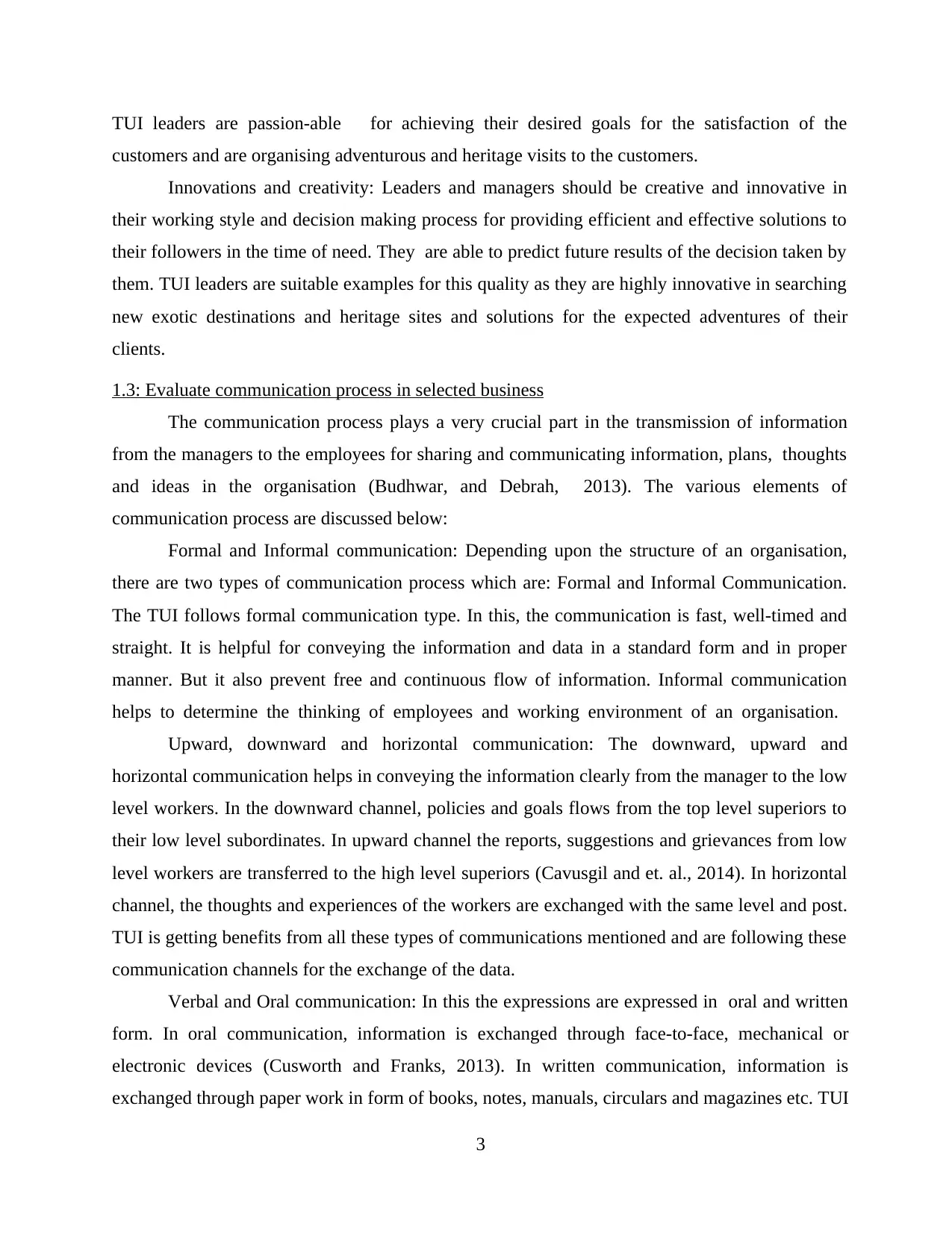
TUI leaders are passion-able for achieving their desired goals for the satisfaction of the
customers and are organising adventurous and heritage visits to the customers.
Innovations and creativity: Leaders and managers should be creative and innovative in
their working style and decision making process for providing efficient and effective solutions to
their followers in the time of need. They are able to predict future results of the decision taken by
them. TUI leaders are suitable examples for this quality as they are highly innovative in searching
new exotic destinations and heritage sites and solutions for the expected adventures of their
clients.
1.3: Evaluate communication process in selected business
The communication process plays a very crucial part in the transmission of information
from the managers to the employees for sharing and communicating information, plans, thoughts
and ideas in the organisation (Budhwar, and Debrah, 2013). The various elements of
communication process are discussed below:
Formal and Informal communication: Depending upon the structure of an organisation,
there are two types of communication process which are: Formal and Informal Communication.
The TUI follows formal communication type. In this, the communication is fast, well-timed and
straight. It is helpful for conveying the information and data in a standard form and in proper
manner. But it also prevent free and continuous flow of information. Informal communication
helps to determine the thinking of employees and working environment of an organisation.
Upward, downward and horizontal communication: The downward, upward and
horizontal communication helps in conveying the information clearly from the manager to the low
level workers. In the downward channel, policies and goals flows from the top level superiors to
their low level subordinates. In upward channel the reports, suggestions and grievances from low
level workers are transferred to the high level superiors (Cavusgil and et. al., 2014). In horizontal
channel, the thoughts and experiences of the workers are exchanged with the same level and post.
TUI is getting benefits from all these types of communications mentioned and are following these
communication channels for the exchange of the data.
Verbal and Oral communication: In this the expressions are expressed in oral and written
form. In oral communication, information is exchanged through face-to-face, mechanical or
electronic devices (Cusworth and Franks, 2013). In written communication, information is
exchanged through paper work in form of books, notes, manuals, circulars and magazines etc. TUI
3
customers and are organising adventurous and heritage visits to the customers.
Innovations and creativity: Leaders and managers should be creative and innovative in
their working style and decision making process for providing efficient and effective solutions to
their followers in the time of need. They are able to predict future results of the decision taken by
them. TUI leaders are suitable examples for this quality as they are highly innovative in searching
new exotic destinations and heritage sites and solutions for the expected adventures of their
clients.
1.3: Evaluate communication process in selected business
The communication process plays a very crucial part in the transmission of information
from the managers to the employees for sharing and communicating information, plans, thoughts
and ideas in the organisation (Budhwar, and Debrah, 2013). The various elements of
communication process are discussed below:
Formal and Informal communication: Depending upon the structure of an organisation,
there are two types of communication process which are: Formal and Informal Communication.
The TUI follows formal communication type. In this, the communication is fast, well-timed and
straight. It is helpful for conveying the information and data in a standard form and in proper
manner. But it also prevent free and continuous flow of information. Informal communication
helps to determine the thinking of employees and working environment of an organisation.
Upward, downward and horizontal communication: The downward, upward and
horizontal communication helps in conveying the information clearly from the manager to the low
level workers. In the downward channel, policies and goals flows from the top level superiors to
their low level subordinates. In upward channel the reports, suggestions and grievances from low
level workers are transferred to the high level superiors (Cavusgil and et. al., 2014). In horizontal
channel, the thoughts and experiences of the workers are exchanged with the same level and post.
TUI is getting benefits from all these types of communications mentioned and are following these
communication channels for the exchange of the data.
Verbal and Oral communication: In this the expressions are expressed in oral and written
form. In oral communication, information is exchanged through face-to-face, mechanical or
electronic devices (Cusworth and Franks, 2013). In written communication, information is
exchanged through paper work in form of books, notes, manuals, circulars and magazines etc. TUI
3
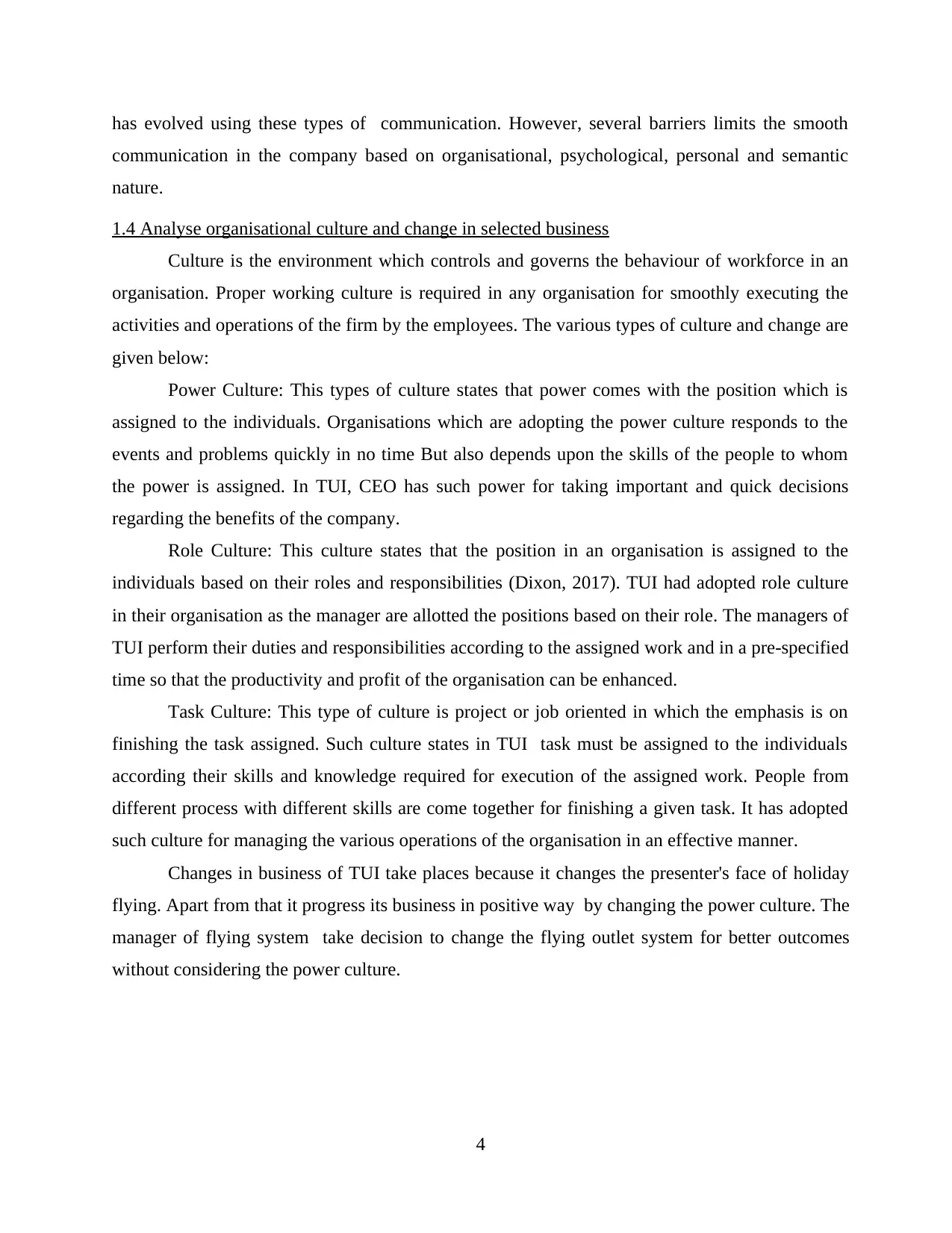
has evolved using these types of communication. However, several barriers limits the smooth
communication in the company based on organisational, psychological, personal and semantic
nature.
1.4 Analyse organisational culture and change in selected business
Culture is the environment which controls and governs the behaviour of workforce in an
organisation. Proper working culture is required in any organisation for smoothly executing the
activities and operations of the firm by the employees. The various types of culture and change are
given below:
Power Culture: This types of culture states that power comes with the position which is
assigned to the individuals. Organisations which are adopting the power culture responds to the
events and problems quickly in no time But also depends upon the skills of the people to whom
the power is assigned. In TUI, CEO has such power for taking important and quick decisions
regarding the benefits of the company.
Role Culture: This culture states that the position in an organisation is assigned to the
individuals based on their roles and responsibilities (Dixon, 2017). TUI had adopted role culture
in their organisation as the manager are allotted the positions based on their role. The managers of
TUI perform their duties and responsibilities according to the assigned work and in a pre-specified
time so that the productivity and profit of the organisation can be enhanced.
Task Culture: This type of culture is project or job oriented in which the emphasis is on
finishing the task assigned. Such culture states in TUI task must be assigned to the individuals
according their skills and knowledge required for execution of the assigned work. People from
different process with different skills are come together for finishing a given task. It has adopted
such culture for managing the various operations of the organisation in an effective manner.
Changes in business of TUI take places because it changes the presenter's face of holiday
flying. Apart from that it progress its business in positive way by changing the power culture. The
manager of flying system take decision to change the flying outlet system for better outcomes
without considering the power culture.
4
communication in the company based on organisational, psychological, personal and semantic
nature.
1.4 Analyse organisational culture and change in selected business
Culture is the environment which controls and governs the behaviour of workforce in an
organisation. Proper working culture is required in any organisation for smoothly executing the
activities and operations of the firm by the employees. The various types of culture and change are
given below:
Power Culture: This types of culture states that power comes with the position which is
assigned to the individuals. Organisations which are adopting the power culture responds to the
events and problems quickly in no time But also depends upon the skills of the people to whom
the power is assigned. In TUI, CEO has such power for taking important and quick decisions
regarding the benefits of the company.
Role Culture: This culture states that the position in an organisation is assigned to the
individuals based on their roles and responsibilities (Dixon, 2017). TUI had adopted role culture
in their organisation as the manager are allotted the positions based on their role. The managers of
TUI perform their duties and responsibilities according to the assigned work and in a pre-specified
time so that the productivity and profit of the organisation can be enhanced.
Task Culture: This type of culture is project or job oriented in which the emphasis is on
finishing the task assigned. Such culture states in TUI task must be assigned to the individuals
according their skills and knowledge required for execution of the assigned work. People from
different process with different skills are come together for finishing a given task. It has adopted
such culture for managing the various operations of the organisation in an effective manner.
Changes in business of TUI take places because it changes the presenter's face of holiday
flying. Apart from that it progress its business in positive way by changing the power culture. The
manager of flying system take decision to change the flying outlet system for better outcomes
without considering the power culture.
4
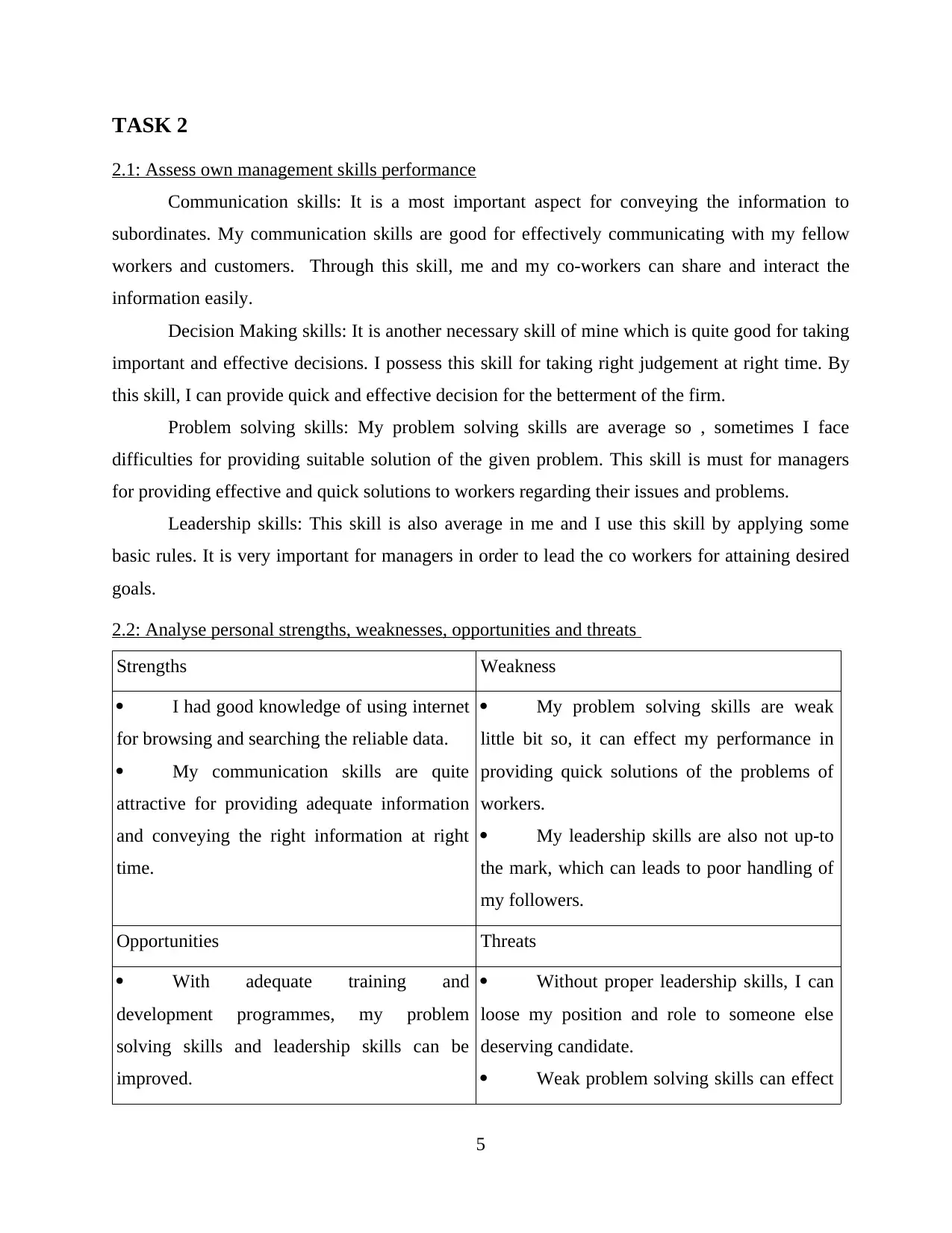
TASK 2
2.1: Assess own management skills performance
Communication skills: It is a most important aspect for conveying the information to
subordinates. My communication skills are good for effectively communicating with my fellow
workers and customers. Through this skill, me and my co-workers can share and interact the
information easily.
Decision Making skills: It is another necessary skill of mine which is quite good for taking
important and effective decisions. I possess this skill for taking right judgement at right time. By
this skill, I can provide quick and effective decision for the betterment of the firm.
Problem solving skills: My problem solving skills are average so , sometimes I face
difficulties for providing suitable solution of the given problem. This skill is must for managers
for providing effective and quick solutions to workers regarding their issues and problems.
Leadership skills: This skill is also average in me and I use this skill by applying some
basic rules. It is very important for managers in order to lead the co workers for attaining desired
goals.
2.2: Analyse personal strengths, weaknesses, opportunities and threats
Strengths Weakness
I had good knowledge of using internet
for browsing and searching the reliable data.
My communication skills are quite
attractive for providing adequate information
and conveying the right information at right
time.
My problem solving skills are weak
little bit so, it can effect my performance in
providing quick solutions of the problems of
workers.
My leadership skills are also not up-to
the mark, which can leads to poor handling of
my followers.
Opportunities Threats
With adequate training and
development programmes, my problem
solving skills and leadership skills can be
improved.
Without proper leadership skills, I can
loose my position and role to someone else
deserving candidate.
Weak problem solving skills can effect
5
2.1: Assess own management skills performance
Communication skills: It is a most important aspect for conveying the information to
subordinates. My communication skills are good for effectively communicating with my fellow
workers and customers. Through this skill, me and my co-workers can share and interact the
information easily.
Decision Making skills: It is another necessary skill of mine which is quite good for taking
important and effective decisions. I possess this skill for taking right judgement at right time. By
this skill, I can provide quick and effective decision for the betterment of the firm.
Problem solving skills: My problem solving skills are average so , sometimes I face
difficulties for providing suitable solution of the given problem. This skill is must for managers
for providing effective and quick solutions to workers regarding their issues and problems.
Leadership skills: This skill is also average in me and I use this skill by applying some
basic rules. It is very important for managers in order to lead the co workers for attaining desired
goals.
2.2: Analyse personal strengths, weaknesses, opportunities and threats
Strengths Weakness
I had good knowledge of using internet
for browsing and searching the reliable data.
My communication skills are quite
attractive for providing adequate information
and conveying the right information at right
time.
My problem solving skills are weak
little bit so, it can effect my performance in
providing quick solutions of the problems of
workers.
My leadership skills are also not up-to
the mark, which can leads to poor handling of
my followers.
Opportunities Threats
With adequate training and
development programmes, my problem
solving skills and leadership skills can be
improved.
Without proper leadership skills, I can
loose my position and role to someone else
deserving candidate.
Weak problem solving skills can effect
5
Paraphrase This Document
Need a fresh take? Get an instant paraphrase of this document with our AI Paraphraser
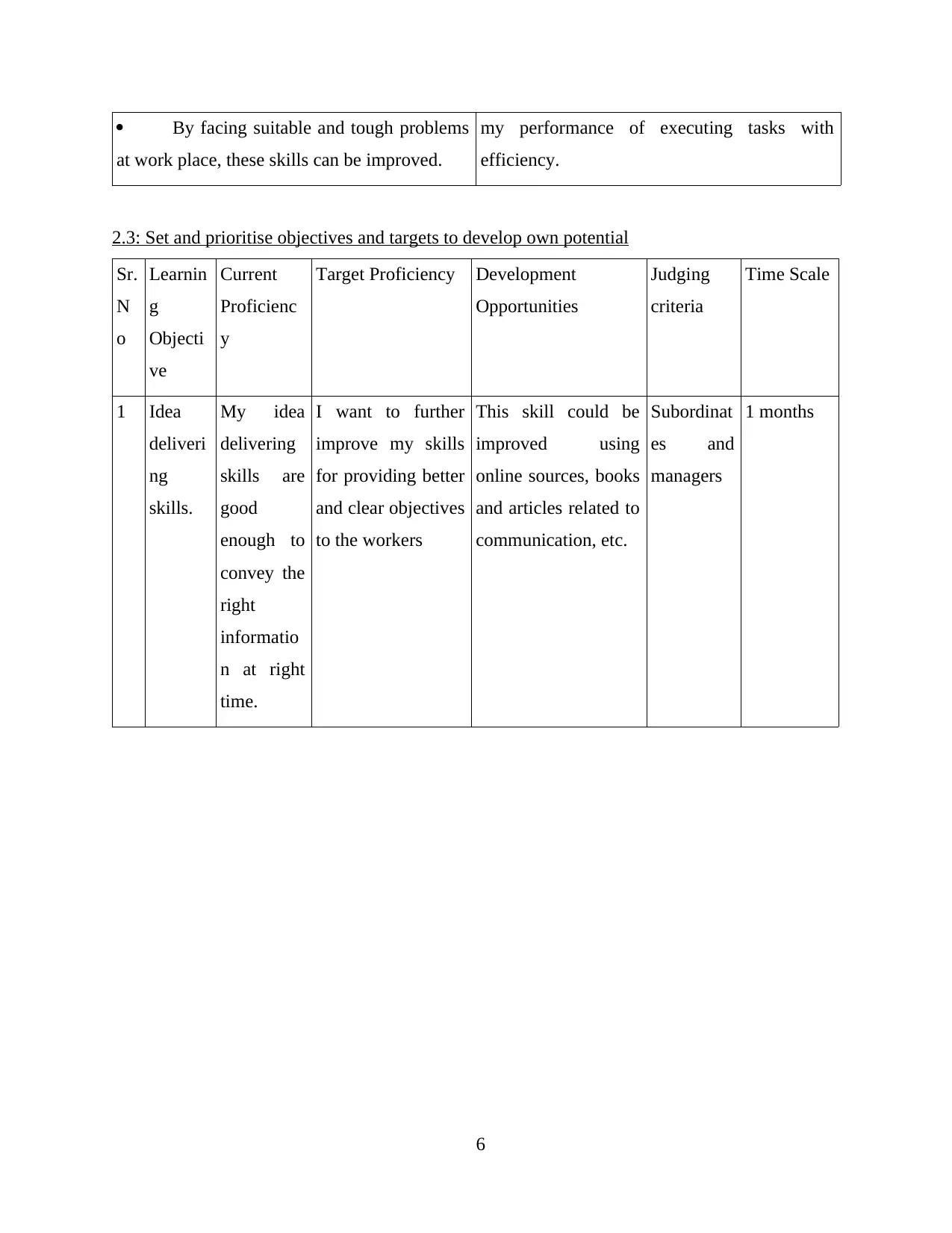
By facing suitable and tough problems
at work place, these skills can be improved.
my performance of executing tasks with
efficiency.
2.3: Set and prioritise objectives and targets to develop own potential
Sr.
N
o
Learnin
g
Objecti
ve
Current
Proficienc
y
Target Proficiency Development
Opportunities
Judging
criteria
Time Scale
1 Idea
deliveri
ng
skills.
My idea
delivering
skills are
good
enough to
convey the
right
informatio
n at right
time.
I want to further
improve my skills
for providing better
and clear objectives
to the workers
This skill could be
improved using
online sources, books
and articles related to
communication, etc.
Subordinat
es and
managers
1 months
6
at work place, these skills can be improved.
my performance of executing tasks with
efficiency.
2.3: Set and prioritise objectives and targets to develop own potential
Sr.
N
o
Learnin
g
Objecti
ve
Current
Proficienc
y
Target Proficiency Development
Opportunities
Judging
criteria
Time Scale
1 Idea
deliveri
ng
skills.
My idea
delivering
skills are
good
enough to
convey the
right
informatio
n at right
time.
I want to further
improve my skills
for providing better
and clear objectives
to the workers
This skill could be
improved using
online sources, books
and articles related to
communication, etc.
Subordinat
es and
managers
1 months
6
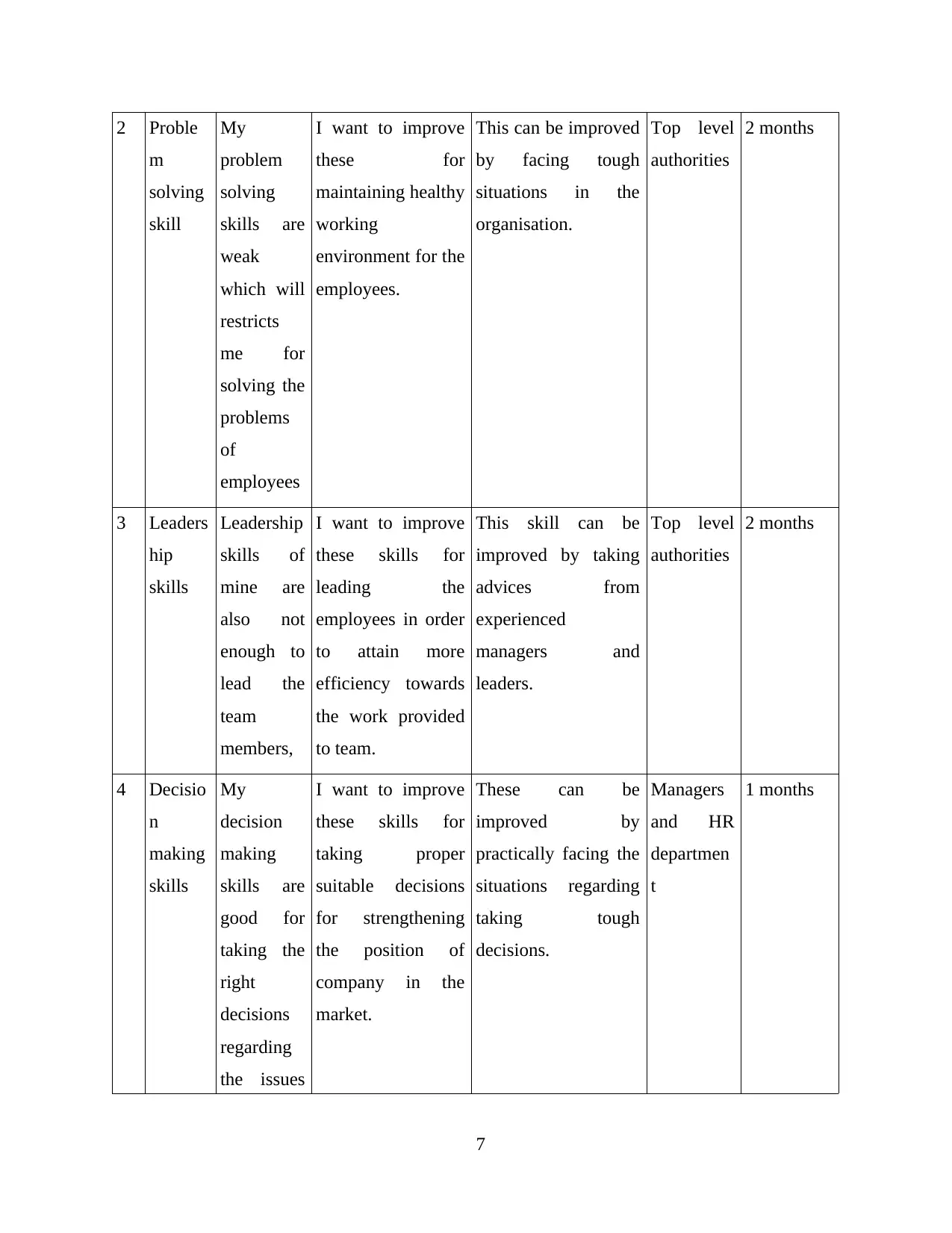
2 Proble
m
solving
skill
My
problem
solving
skills are
weak
which will
restricts
me for
solving the
problems
of
employees
I want to improve
these for
maintaining healthy
working
environment for the
employees.
This can be improved
by facing tough
situations in the
organisation.
Top level
authorities
2 months
3 Leaders
hip
skills
Leadership
skills of
mine are
also not
enough to
lead the
team
members,
I want to improve
these skills for
leading the
employees in order
to attain more
efficiency towards
the work provided
to team.
This skill can be
improved by taking
advices from
experienced
managers and
leaders.
Top level
authorities
2 months
4 Decisio
n
making
skills
My
decision
making
skills are
good for
taking the
right
decisions
regarding
the issues
I want to improve
these skills for
taking proper
suitable decisions
for strengthening
the position of
company in the
market.
These can be
improved by
practically facing the
situations regarding
taking tough
decisions.
Managers
and HR
departmen
t
1 months
7
m
solving
skill
My
problem
solving
skills are
weak
which will
restricts
me for
solving the
problems
of
employees
I want to improve
these for
maintaining healthy
working
environment for the
employees.
This can be improved
by facing tough
situations in the
organisation.
Top level
authorities
2 months
3 Leaders
hip
skills
Leadership
skills of
mine are
also not
enough to
lead the
team
members,
I want to improve
these skills for
leading the
employees in order
to attain more
efficiency towards
the work provided
to team.
This skill can be
improved by taking
advices from
experienced
managers and
leaders.
Top level
authorities
2 months
4 Decisio
n
making
skills
My
decision
making
skills are
good for
taking the
right
decisions
regarding
the issues
I want to improve
these skills for
taking proper
suitable decisions
for strengthening
the position of
company in the
market.
These can be
improved by
practically facing the
situations regarding
taking tough
decisions.
Managers
and HR
departmen
t
1 months
7
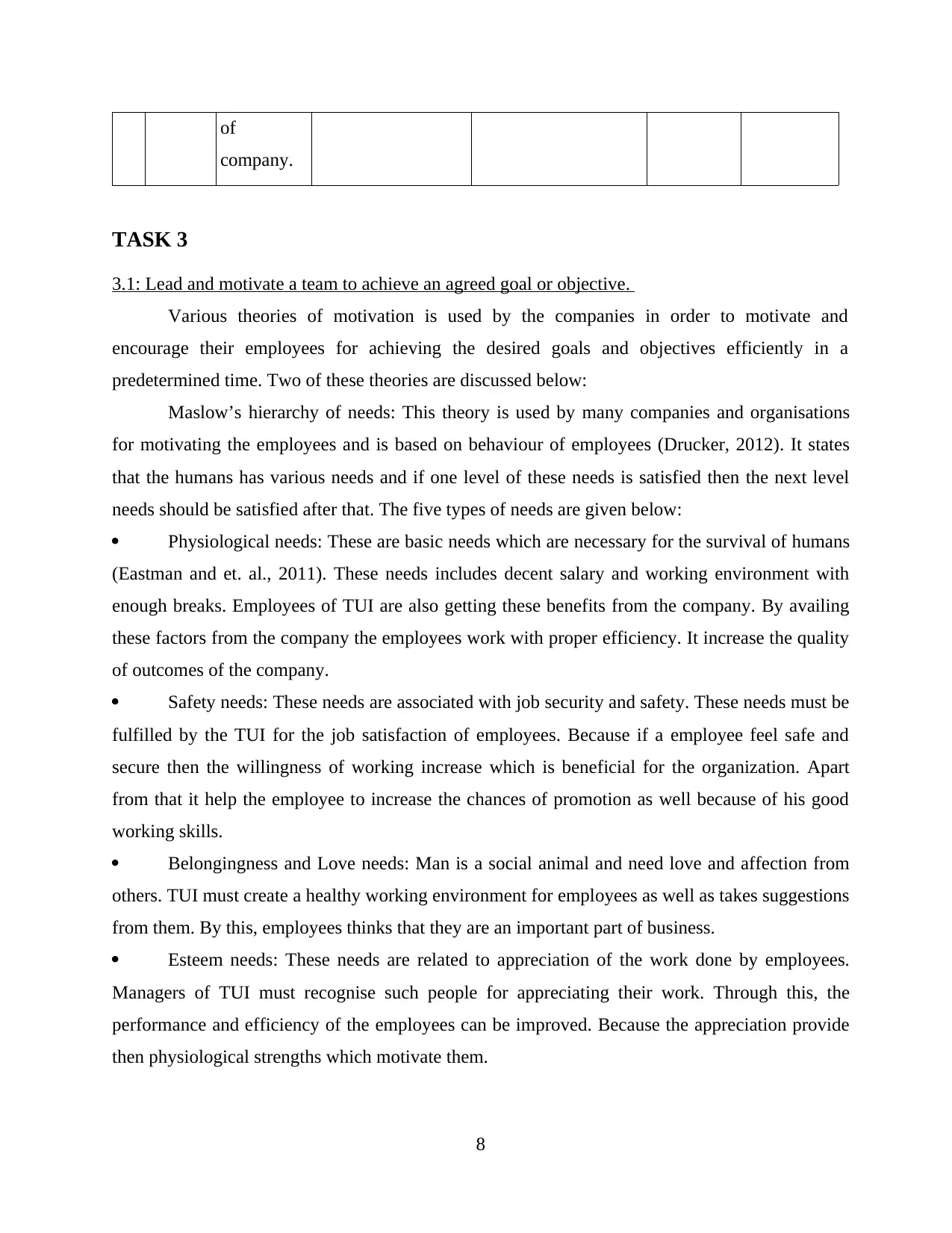
of
company.
TASK 3
3.1: Lead and motivate a team to achieve an agreed goal or objective.
Various theories of motivation is used by the companies in order to motivate and
encourage their employees for achieving the desired goals and objectives efficiently in a
predetermined time. Two of these theories are discussed below:
Maslow’s hierarchy of needs: This theory is used by many companies and organisations
for motivating the employees and is based on behaviour of employees (Drucker, 2012). It states
that the humans has various needs and if one level of these needs is satisfied then the next level
needs should be satisfied after that. The five types of needs are given below:
Physiological needs: These are basic needs which are necessary for the survival of humans
(Eastman and et. al., 2011). These needs includes decent salary and working environment with
enough breaks. Employees of TUI are also getting these benefits from the company. By availing
these factors from the company the employees work with proper efficiency. It increase the quality
of outcomes of the company.
Safety needs: These needs are associated with job security and safety. These needs must be
fulfilled by the TUI for the job satisfaction of employees. Because if a employee feel safe and
secure then the willingness of working increase which is beneficial for the organization. Apart
from that it help the employee to increase the chances of promotion as well because of his good
working skills.
Belongingness and Love needs: Man is a social animal and need love and affection from
others. TUI must create a healthy working environment for employees as well as takes suggestions
from them. By this, employees thinks that they are an important part of business.
Esteem needs: These needs are related to appreciation of the work done by employees.
Managers of TUI must recognise such people for appreciating their work. Through this, the
performance and efficiency of the employees can be improved. Because the appreciation provide
then physiological strengths which motivate them.
8
company.
TASK 3
3.1: Lead and motivate a team to achieve an agreed goal or objective.
Various theories of motivation is used by the companies in order to motivate and
encourage their employees for achieving the desired goals and objectives efficiently in a
predetermined time. Two of these theories are discussed below:
Maslow’s hierarchy of needs: This theory is used by many companies and organisations
for motivating the employees and is based on behaviour of employees (Drucker, 2012). It states
that the humans has various needs and if one level of these needs is satisfied then the next level
needs should be satisfied after that. The five types of needs are given below:
Physiological needs: These are basic needs which are necessary for the survival of humans
(Eastman and et. al., 2011). These needs includes decent salary and working environment with
enough breaks. Employees of TUI are also getting these benefits from the company. By availing
these factors from the company the employees work with proper efficiency. It increase the quality
of outcomes of the company.
Safety needs: These needs are associated with job security and safety. These needs must be
fulfilled by the TUI for the job satisfaction of employees. Because if a employee feel safe and
secure then the willingness of working increase which is beneficial for the organization. Apart
from that it help the employee to increase the chances of promotion as well because of his good
working skills.
Belongingness and Love needs: Man is a social animal and need love and affection from
others. TUI must create a healthy working environment for employees as well as takes suggestions
from them. By this, employees thinks that they are an important part of business.
Esteem needs: These needs are related to appreciation of the work done by employees.
Managers of TUI must recognise such people for appreciating their work. Through this, the
performance and efficiency of the employees can be improved. Because the appreciation provide
then physiological strengths which motivate them.
8
Secure Best Marks with AI Grader
Need help grading? Try our AI Grader for instant feedback on your assignments.
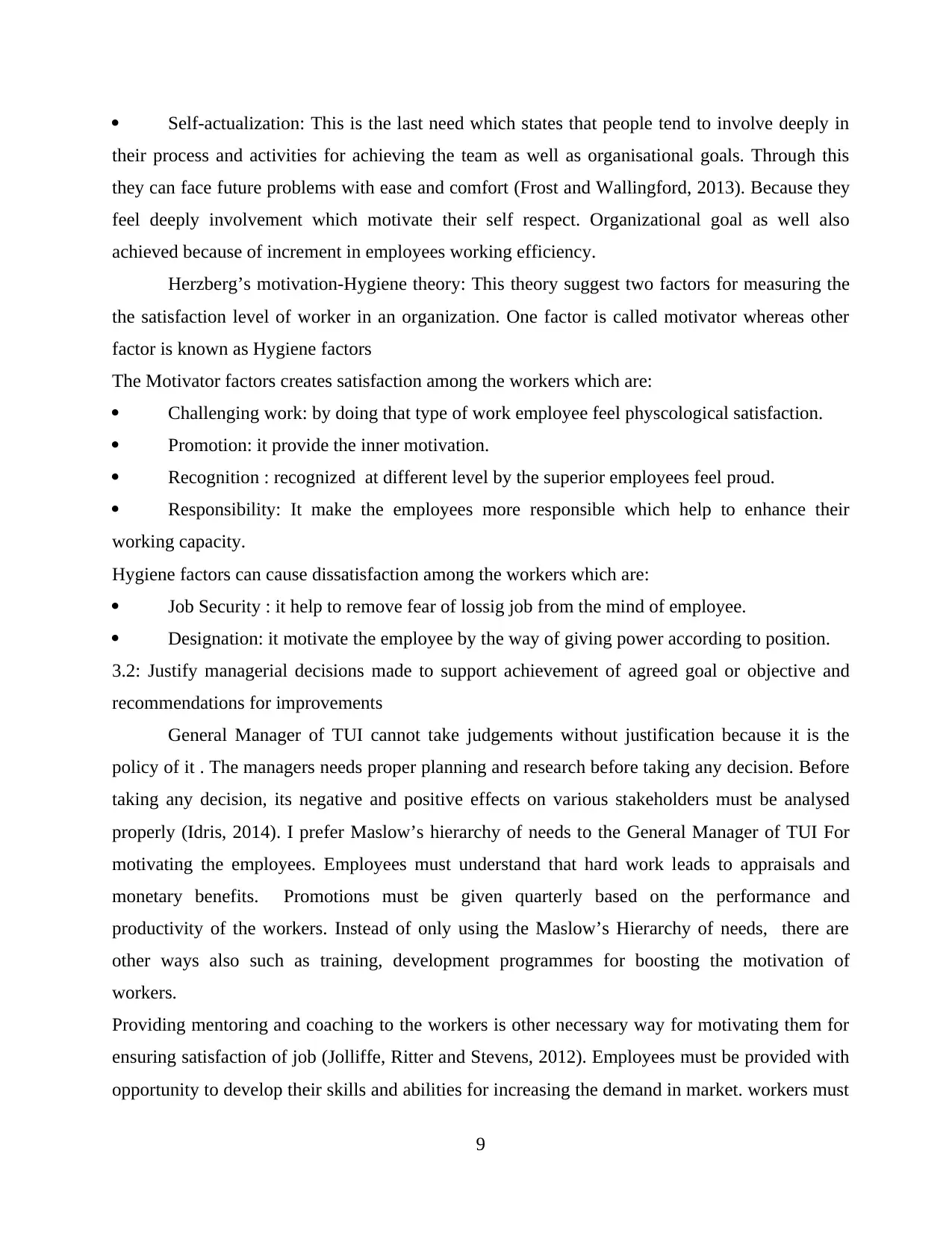
Self-actualization: This is the last need which states that people tend to involve deeply in
their process and activities for achieving the team as well as organisational goals. Through this
they can face future problems with ease and comfort (Frost and Wallingford, 2013). Because they
feel deeply involvement which motivate their self respect. Organizational goal as well also
achieved because of increment in employees working efficiency.
Herzberg’s motivation-Hygiene theory: This theory suggest two factors for measuring the
the satisfaction level of worker in an organization. One factor is called motivator whereas other
factor is known as Hygiene factors
The Motivator factors creates satisfaction among the workers which are:
Challenging work: by doing that type of work employee feel physcological satisfaction.
Promotion: it provide the inner motivation.
Recognition : recognized at different level by the superior employees feel proud.
Responsibility: It make the employees more responsible which help to enhance their
working capacity.
Hygiene factors can cause dissatisfaction among the workers which are:
Job Security : it help to remove fear of lossig job from the mind of employee.
Designation: it motivate the employee by the way of giving power according to position.
3.2: Justify managerial decisions made to support achievement of agreed goal or objective and
recommendations for improvements
General Manager of TUI cannot take judgements without justification because it is the
policy of it . The managers needs proper planning and research before taking any decision. Before
taking any decision, its negative and positive effects on various stakeholders must be analysed
properly (Idris, 2014). I prefer Maslow’s hierarchy of needs to the General Manager of TUI For
motivating the employees. Employees must understand that hard work leads to appraisals and
monetary benefits. Promotions must be given quarterly based on the performance and
productivity of the workers. Instead of only using the Maslow’s Hierarchy of needs, there are
other ways also such as training, development programmes for boosting the motivation of
workers.
Providing mentoring and coaching to the workers is other necessary way for motivating them for
ensuring satisfaction of job (Jolliffe, Ritter and Stevens, 2012). Employees must be provided with
opportunity to develop their skills and abilities for increasing the demand in market. workers must
9
their process and activities for achieving the team as well as organisational goals. Through this
they can face future problems with ease and comfort (Frost and Wallingford, 2013). Because they
feel deeply involvement which motivate their self respect. Organizational goal as well also
achieved because of increment in employees working efficiency.
Herzberg’s motivation-Hygiene theory: This theory suggest two factors for measuring the
the satisfaction level of worker in an organization. One factor is called motivator whereas other
factor is known as Hygiene factors
The Motivator factors creates satisfaction among the workers which are:
Challenging work: by doing that type of work employee feel physcological satisfaction.
Promotion: it provide the inner motivation.
Recognition : recognized at different level by the superior employees feel proud.
Responsibility: It make the employees more responsible which help to enhance their
working capacity.
Hygiene factors can cause dissatisfaction among the workers which are:
Job Security : it help to remove fear of lossig job from the mind of employee.
Designation: it motivate the employee by the way of giving power according to position.
3.2: Justify managerial decisions made to support achievement of agreed goal or objective and
recommendations for improvements
General Manager of TUI cannot take judgements without justification because it is the
policy of it . The managers needs proper planning and research before taking any decision. Before
taking any decision, its negative and positive effects on various stakeholders must be analysed
properly (Idris, 2014). I prefer Maslow’s hierarchy of needs to the General Manager of TUI For
motivating the employees. Employees must understand that hard work leads to appraisals and
monetary benefits. Promotions must be given quarterly based on the performance and
productivity of the workers. Instead of only using the Maslow’s Hierarchy of needs, there are
other ways also such as training, development programmes for boosting the motivation of
workers.
Providing mentoring and coaching to the workers is other necessary way for motivating them for
ensuring satisfaction of job (Jolliffe, Ritter and Stevens, 2012). Employees must be provided with
opportunity to develop their skills and abilities for increasing the demand in market. workers must
9
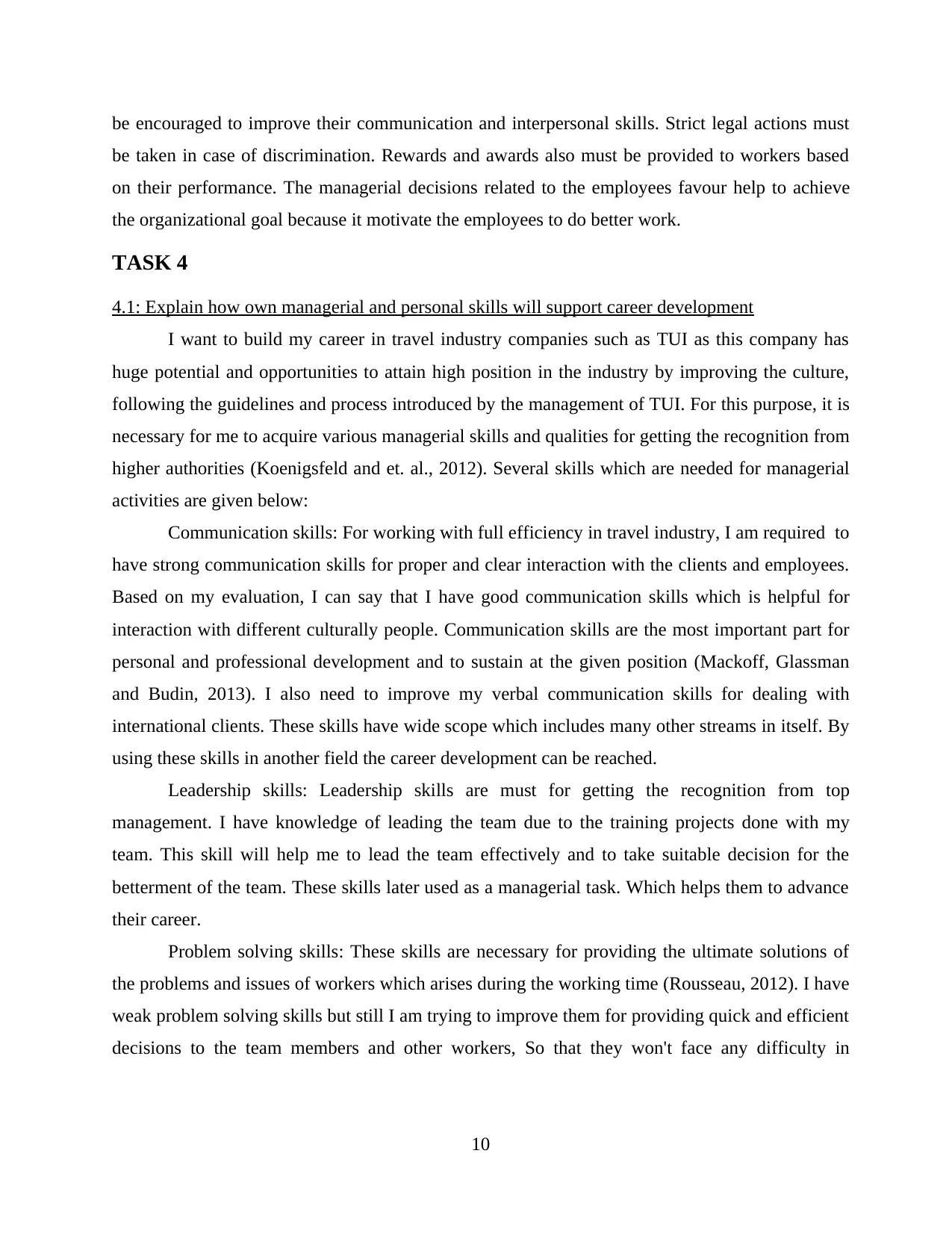
be encouraged to improve their communication and interpersonal skills. Strict legal actions must
be taken in case of discrimination. Rewards and awards also must be provided to workers based
on their performance. The managerial decisions related to the employees favour help to achieve
the organizational goal because it motivate the employees to do better work.
TASK 4
4.1: Explain how own managerial and personal skills will support career development
I want to build my career in travel industry companies such as TUI as this company has
huge potential and opportunities to attain high position in the industry by improving the culture,
following the guidelines and process introduced by the management of TUI. For this purpose, it is
necessary for me to acquire various managerial skills and qualities for getting the recognition from
higher authorities (Koenigsfeld and et. al., 2012). Several skills which are needed for managerial
activities are given below:
Communication skills: For working with full efficiency in travel industry, I am required to
have strong communication skills for proper and clear interaction with the clients and employees.
Based on my evaluation, I can say that I have good communication skills which is helpful for
interaction with different culturally people. Communication skills are the most important part for
personal and professional development and to sustain at the given position (Mackoff, Glassman
and Budin, 2013). I also need to improve my verbal communication skills for dealing with
international clients. These skills have wide scope which includes many other streams in itself. By
using these skills in another field the career development can be reached.
Leadership skills: Leadership skills are must for getting the recognition from top
management. I have knowledge of leading the team due to the training projects done with my
team. This skill will help me to lead the team effectively and to take suitable decision for the
betterment of the team. These skills later used as a managerial task. Which helps them to advance
their career.
Problem solving skills: These skills are necessary for providing the ultimate solutions of
the problems and issues of workers which arises during the working time (Rousseau, 2012). I have
weak problem solving skills but still I am trying to improve them for providing quick and efficient
decisions to the team members and other workers, So that they won't face any difficulty in
10
be taken in case of discrimination. Rewards and awards also must be provided to workers based
on their performance. The managerial decisions related to the employees favour help to achieve
the organizational goal because it motivate the employees to do better work.
TASK 4
4.1: Explain how own managerial and personal skills will support career development
I want to build my career in travel industry companies such as TUI as this company has
huge potential and opportunities to attain high position in the industry by improving the culture,
following the guidelines and process introduced by the management of TUI. For this purpose, it is
necessary for me to acquire various managerial skills and qualities for getting the recognition from
higher authorities (Koenigsfeld and et. al., 2012). Several skills which are needed for managerial
activities are given below:
Communication skills: For working with full efficiency in travel industry, I am required to
have strong communication skills for proper and clear interaction with the clients and employees.
Based on my evaluation, I can say that I have good communication skills which is helpful for
interaction with different culturally people. Communication skills are the most important part for
personal and professional development and to sustain at the given position (Mackoff, Glassman
and Budin, 2013). I also need to improve my verbal communication skills for dealing with
international clients. These skills have wide scope which includes many other streams in itself. By
using these skills in another field the career development can be reached.
Leadership skills: Leadership skills are must for getting the recognition from top
management. I have knowledge of leading the team due to the training projects done with my
team. This skill will help me to lead the team effectively and to take suitable decision for the
betterment of the team. These skills later used as a managerial task. Which helps them to advance
their career.
Problem solving skills: These skills are necessary for providing the ultimate solutions of
the problems and issues of workers which arises during the working time (Rousseau, 2012). I have
weak problem solving skills but still I am trying to improve them for providing quick and efficient
decisions to the team members and other workers, So that they won't face any difficulty in
10
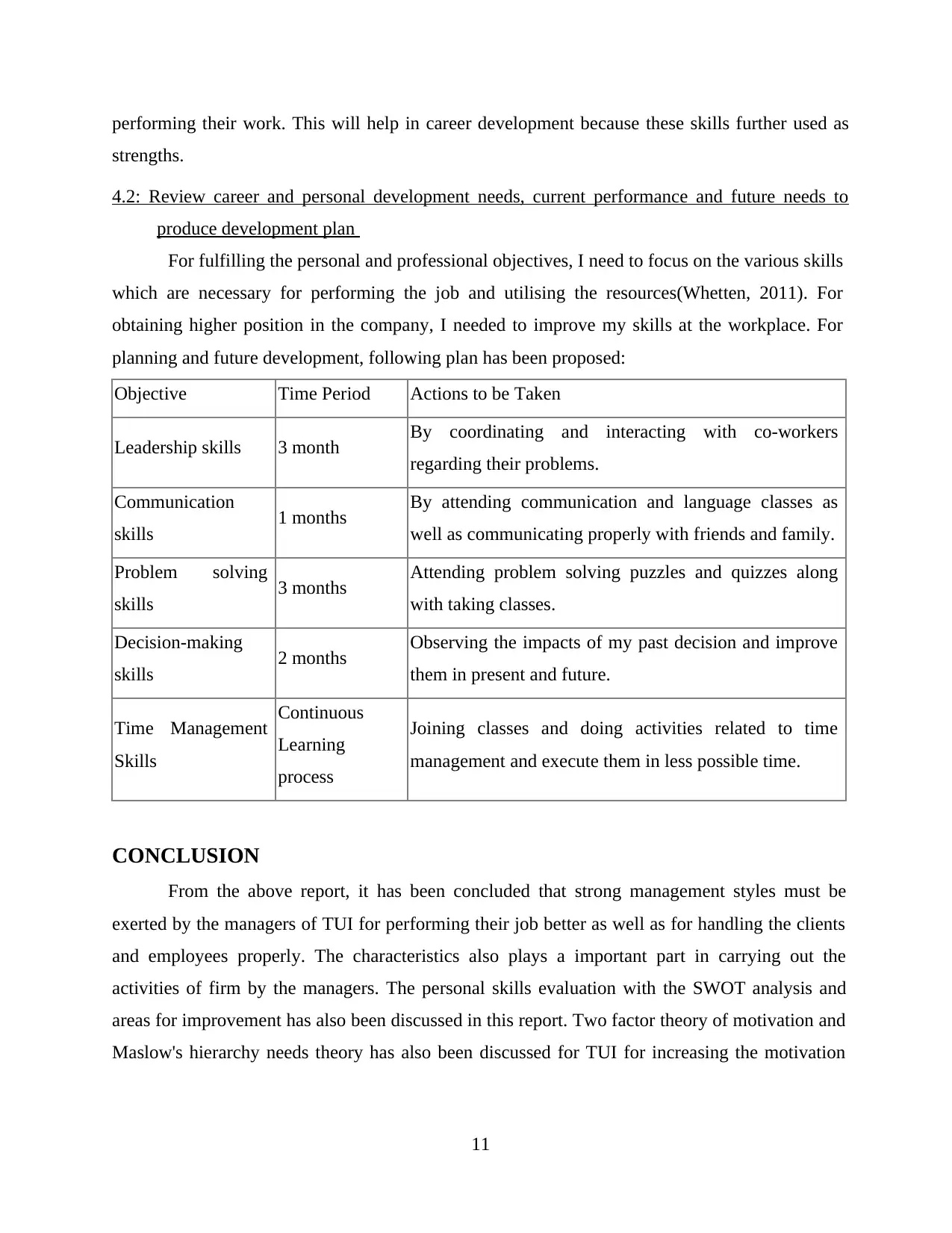
performing their work. This will help in career development because these skills further used as
strengths.
4.2: Review career and personal development needs, current performance and future needs to
produce development plan
For fulfilling the personal and professional objectives, I need to focus on the various skills
which are necessary for performing the job and utilising the resources(Whetten, 2011). For
obtaining higher position in the company, I needed to improve my skills at the workplace. For
planning and future development, following plan has been proposed:
Objective Time Period Actions to be Taken
Leadership skills 3 month By coordinating and interacting with co-workers
regarding their problems.
Communication
skills 1 months By attending communication and language classes as
well as communicating properly with friends and family.
Problem solving
skills 3 months Attending problem solving puzzles and quizzes along
with taking classes.
Decision-making
skills 2 months Observing the impacts of my past decision and improve
them in present and future.
Time Management
Skills
Continuous
Learning
process
Joining classes and doing activities related to time
management and execute them in less possible time.
CONCLUSION
From the above report, it has been concluded that strong management styles must be
exerted by the managers of TUI for performing their job better as well as for handling the clients
and employees properly. The characteristics also plays a important part in carrying out the
activities of firm by the managers. The personal skills evaluation with the SWOT analysis and
areas for improvement has also been discussed in this report. Two factor theory of motivation and
Maslow's hierarchy needs theory has also been discussed for TUI for increasing the motivation
11
strengths.
4.2: Review career and personal development needs, current performance and future needs to
produce development plan
For fulfilling the personal and professional objectives, I need to focus on the various skills
which are necessary for performing the job and utilising the resources(Whetten, 2011). For
obtaining higher position in the company, I needed to improve my skills at the workplace. For
planning and future development, following plan has been proposed:
Objective Time Period Actions to be Taken
Leadership skills 3 month By coordinating and interacting with co-workers
regarding their problems.
Communication
skills 1 months By attending communication and language classes as
well as communicating properly with friends and family.
Problem solving
skills 3 months Attending problem solving puzzles and quizzes along
with taking classes.
Decision-making
skills 2 months Observing the impacts of my past decision and improve
them in present and future.
Time Management
Skills
Continuous
Learning
process
Joining classes and doing activities related to time
management and execute them in less possible time.
CONCLUSION
From the above report, it has been concluded that strong management styles must be
exerted by the managers of TUI for performing their job better as well as for handling the clients
and employees properly. The characteristics also plays a important part in carrying out the
activities of firm by the managers. The personal skills evaluation with the SWOT analysis and
areas for improvement has also been discussed in this report. Two factor theory of motivation and
Maslow's hierarchy needs theory has also been discussed for TUI for increasing the motivation
11
Paraphrase This Document
Need a fresh take? Get an instant paraphrase of this document with our AI Paraphraser
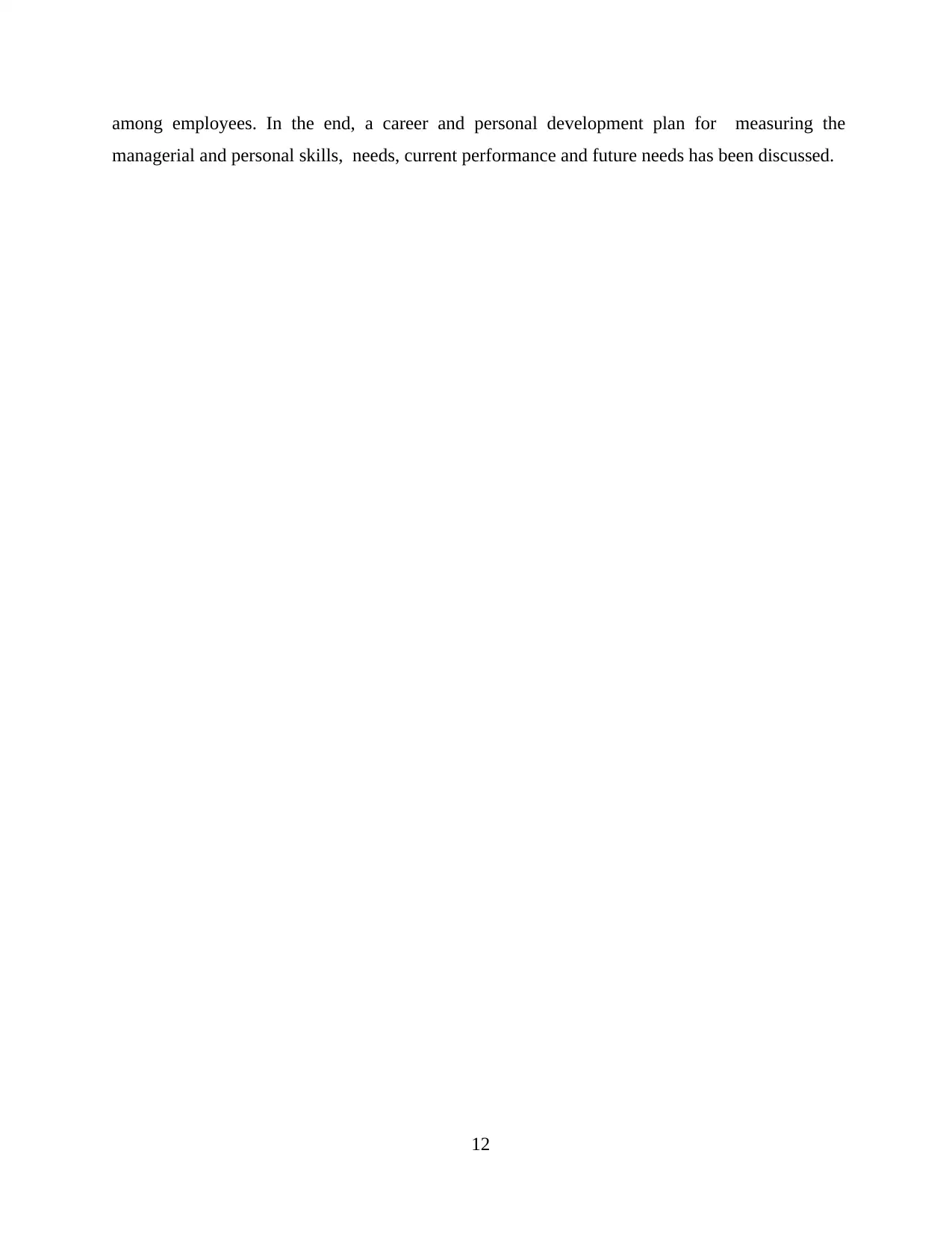
among employees. In the end, a career and personal development plan for measuring the
managerial and personal skills, needs, current performance and future needs has been discussed.
12
managerial and personal skills, needs, current performance and future needs has been discussed.
12
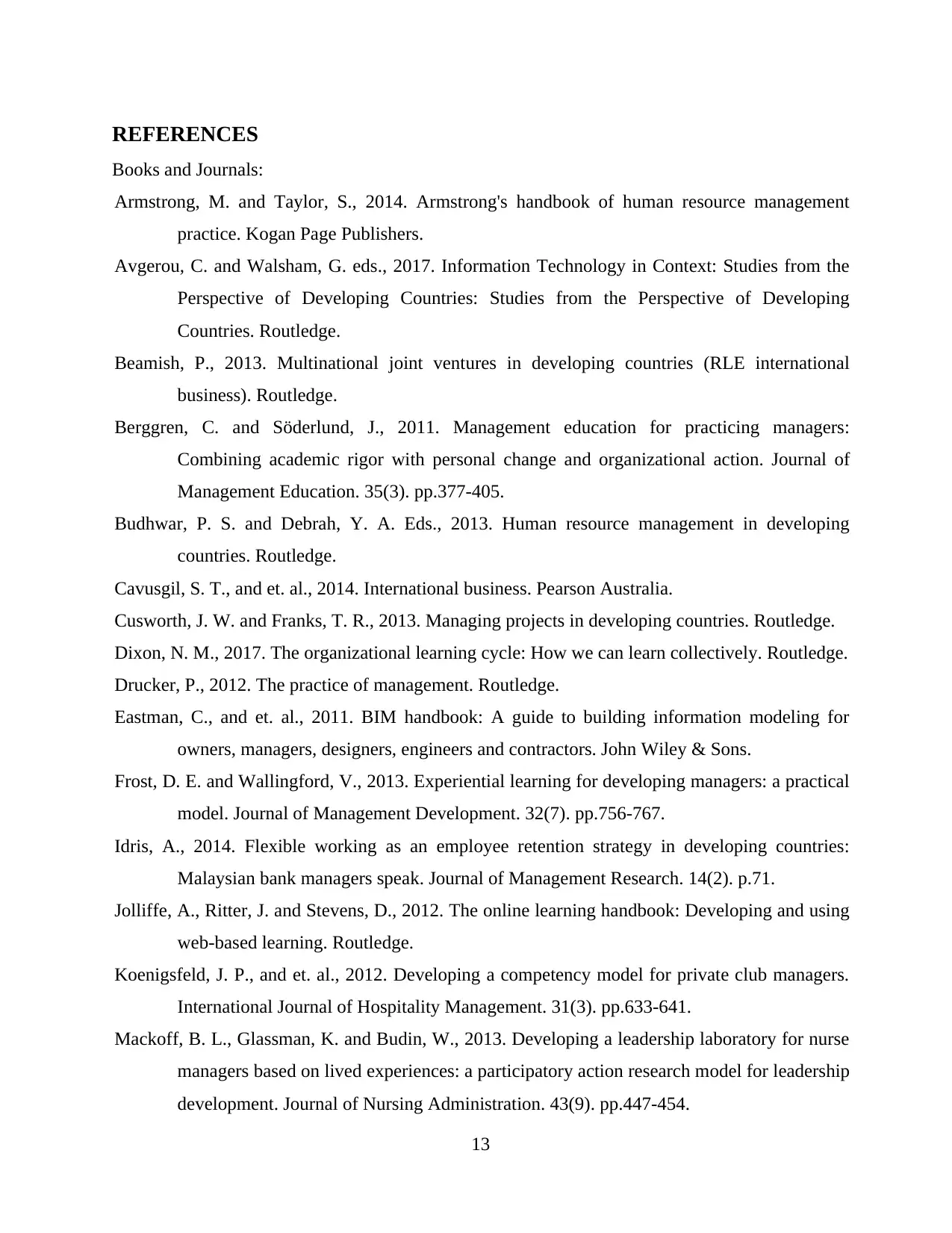
REFERENCES
Books and Journals:
Armstrong, M. and Taylor, S., 2014. Armstrong's handbook of human resource management
practice. Kogan Page Publishers.
Avgerou, C. and Walsham, G. eds., 2017. Information Technology in Context: Studies from the
Perspective of Developing Countries: Studies from the Perspective of Developing
Countries. Routledge.
Beamish, P., 2013. Multinational joint ventures in developing countries (RLE international
business). Routledge.
Berggren, C. and Söderlund, J., 2011. Management education for practicing managers:
Combining academic rigor with personal change and organizational action. Journal of
Management Education. 35(3). pp.377-405.
Budhwar, P. S. and Debrah, Y. A. Eds., 2013. Human resource management in developing
countries. Routledge.
Cavusgil, S. T., and et. al., 2014. International business. Pearson Australia.
Cusworth, J. W. and Franks, T. R., 2013. Managing projects in developing countries. Routledge.
Dixon, N. M., 2017. The organizational learning cycle: How we can learn collectively. Routledge.
Drucker, P., 2012. The practice of management. Routledge.
Eastman, C., and et. al., 2011. BIM handbook: A guide to building information modeling for
owners, managers, designers, engineers and contractors. John Wiley & Sons.
Frost, D. E. and Wallingford, V., 2013. Experiential learning for developing managers: a practical
model. Journal of Management Development. 32(7). pp.756-767.
Idris, A., 2014. Flexible working as an employee retention strategy in developing countries:
Malaysian bank managers speak. Journal of Management Research. 14(2). p.71.
Jolliffe, A., Ritter, J. and Stevens, D., 2012. The online learning handbook: Developing and using
web-based learning. Routledge.
Koenigsfeld, J. P., and et. al., 2012. Developing a competency model for private club managers.
International Journal of Hospitality Management. 31(3). pp.633-641.
Mackoff, B. L., Glassman, K. and Budin, W., 2013. Developing a leadership laboratory for nurse
managers based on lived experiences: a participatory action research model for leadership
development. Journal of Nursing Administration. 43(9). pp.447-454.
13
Books and Journals:
Armstrong, M. and Taylor, S., 2014. Armstrong's handbook of human resource management
practice. Kogan Page Publishers.
Avgerou, C. and Walsham, G. eds., 2017. Information Technology in Context: Studies from the
Perspective of Developing Countries: Studies from the Perspective of Developing
Countries. Routledge.
Beamish, P., 2013. Multinational joint ventures in developing countries (RLE international
business). Routledge.
Berggren, C. and Söderlund, J., 2011. Management education for practicing managers:
Combining academic rigor with personal change and organizational action. Journal of
Management Education. 35(3). pp.377-405.
Budhwar, P. S. and Debrah, Y. A. Eds., 2013. Human resource management in developing
countries. Routledge.
Cavusgil, S. T., and et. al., 2014. International business. Pearson Australia.
Cusworth, J. W. and Franks, T. R., 2013. Managing projects in developing countries. Routledge.
Dixon, N. M., 2017. The organizational learning cycle: How we can learn collectively. Routledge.
Drucker, P., 2012. The practice of management. Routledge.
Eastman, C., and et. al., 2011. BIM handbook: A guide to building information modeling for
owners, managers, designers, engineers and contractors. John Wiley & Sons.
Frost, D. E. and Wallingford, V., 2013. Experiential learning for developing managers: a practical
model. Journal of Management Development. 32(7). pp.756-767.
Idris, A., 2014. Flexible working as an employee retention strategy in developing countries:
Malaysian bank managers speak. Journal of Management Research. 14(2). p.71.
Jolliffe, A., Ritter, J. and Stevens, D., 2012. The online learning handbook: Developing and using
web-based learning. Routledge.
Koenigsfeld, J. P., and et. al., 2012. Developing a competency model for private club managers.
International Journal of Hospitality Management. 31(3). pp.633-641.
Mackoff, B. L., Glassman, K. and Budin, W., 2013. Developing a leadership laboratory for nurse
managers based on lived experiences: a participatory action research model for leadership
development. Journal of Nursing Administration. 43(9). pp.447-454.
13
1 out of 15
Related Documents
Your All-in-One AI-Powered Toolkit for Academic Success.
+13062052269
info@desklib.com
Available 24*7 on WhatsApp / Email
![[object Object]](/_next/static/media/star-bottom.7253800d.svg)
Unlock your academic potential
© 2024 | Zucol Services PVT LTD | All rights reserved.





